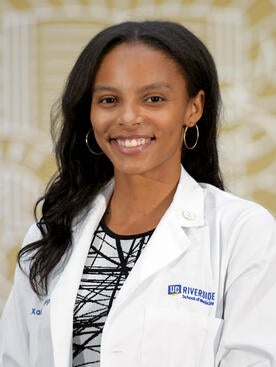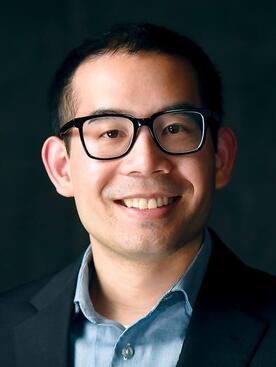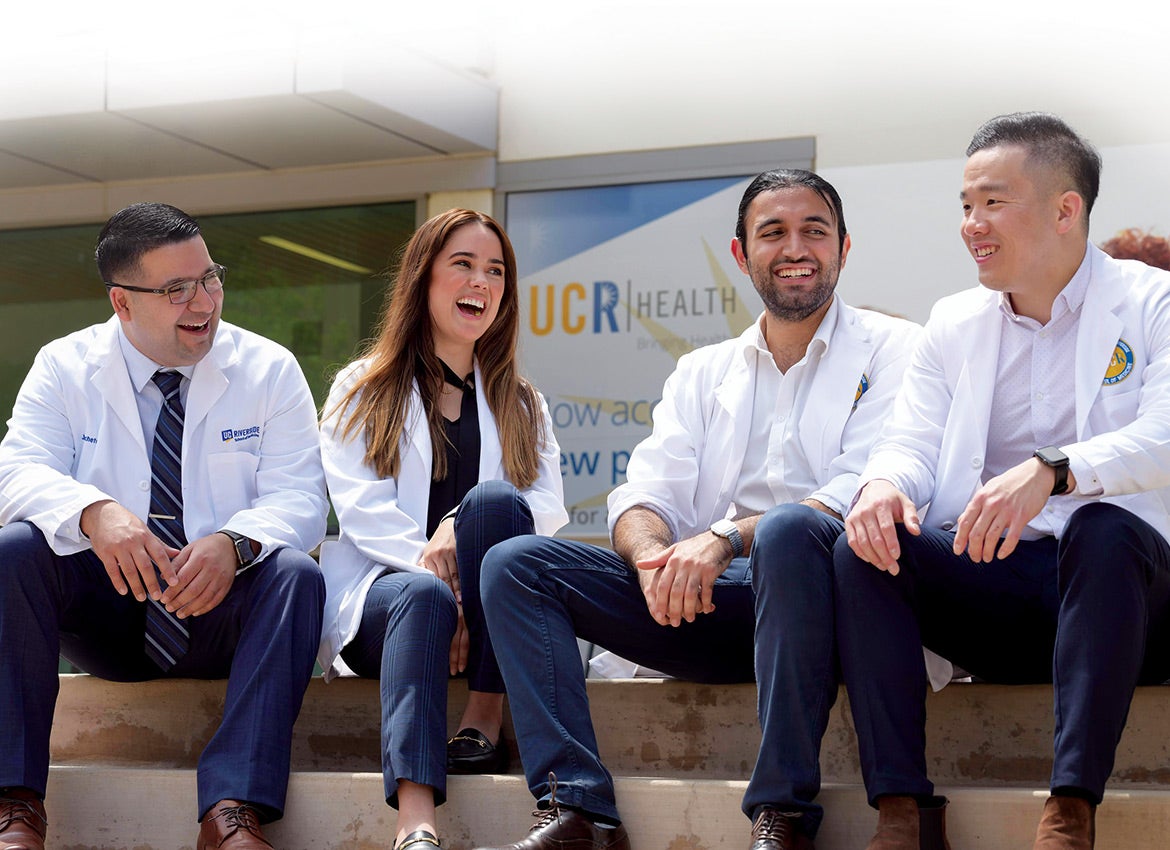At the Heart of Better Healthcare
Central to the School of Medicine’s mission is the students, past and present,
committed to improving the future of healthcare in the region
By Erika Klein
O ver the last decade, the School of Medicine has enrolled some of the Inland Empire’s top students, setting them on a path to provide care in the region they call home — and where the need for more available and accessible health care remains critical. Unique initiatives like the school’s pathway programs and the Longitudinal Ambulatory Care Experience (LACE) program help recruit local students and deepen all students’ connection to the community, while Mission Award scholarships cover medical school costs in exchange for recipients’ commitment to remain in the Inland Empire after graduating. The result is a growing number of physicians now practicing across Inland Southern California and students committed to serving their communities in the future.
Read how alumnus and Mission Award recipient Dr. Jonathan Pham is making an impact in the region as an infectious disease specialist today, and what inspires current medical student Xaida Wright to help create a healthier Inland Empire of tomorrow.
Xaida Wright
From, and For, the Community

Watching family members struggle with neurological disorders helped convince Xaida Wright to study biochemistry in college. When she spent the summer of her sophomore year shadowing doctors in a Howard University School of Medicine enrichment program, she realized for the first time that she could pursue medicine.
“Being in a professional environment where you are seeing individuals that look like you, or have had similar life experiences as you, is what really showed me I could do medicine,” recalled Wright, a UCR medical student and a class representative for the Class of 2025.
The Rancho Cucamonga native chose to attend UCR’s medical school because of its focus on increasing access to healthcare in the Inland Empire and diversifying medicine.
“With some of my own experiences as well as family members’ experiences in being from underrepresented and underserved communities, I’ve seen the need,” Wright said. “UCR’s mission of working within underserved communities as well as working toward the betterment of those communities through healthcare has been my own mission.”
Despite the School of Medicine’s commitment to diversity — it recently ranked No. 5 for diversity in U.S. News & World Report’s 2023-24 Best Grad School rankings — Wright was initially worried. “I was a little nervous that I would maybe be the only Black individual in my class, or maybe the only Black woman in my class,” she said, pointing to previous experiences as the sole Black student in many of her college science courses.
When Wright started medical school, though, she was pleasantly surprised to find around 10 other Black students in her cohort.
“It has been really nice to see UCR living up to its mission, but also just being able to feel represented made me feel like I actually do have a place here at UCR, and in medicine” she said.
Some of Wright’s classmates are first-generation medical students like her, which she said also helped her fit in.
“Just being able to feel represented made me feel like I actually do have a place here at UCR, and in medicine.”
“UCR picking diverse students, that both look like me and don’t, has been a really enriching experience and has allowed me to feel like a part of something bigger than me,” Wright said.
Wright credits Dr. Emma Simmons, associate dean of student affairs, with helping her thrive by sharing her own experiences.
“Just knowing that there is someone there rooting for you who has already made it as a first-gen has been something I am very grateful for,” Wright said.
“What has impressed me the most about Xaida is that she is a smart, resilient, and insightful young lady,” Simmons said. “She understands and accepts that she has to work longer and harder than most medical students and she is willing to do just that — but not at the expense of turning her back on other students who also might need her help. It is precisely students like Xaida that we need to recruit, support, and retain to help eradicate health inequalities in America.”
In May, Wright was recognized during an end-of-year School of Medicine awards ceremony as an “Outstanding LACE Student” for her participation in the LACE program, which provides first-, second-, and third-year students hands-on clinical experience with community-based primary care providers throughout Inland Southern California. Eventually, Wright hopes to pursue neurology while contributing to underserved communities near her home.
“I think that’s where I belong and where I feel I’ve really thrived and learned the most about not only healthcare but also the complexities of life experiences,” she said.
Wright encourages other first-generation students interested in medicine to follow their passion and remain confident in their abilities.
“You may get a lot of noes, but all you need is one yes — and that goes for medicine, but also just in life,” Wright said. “Sometimes that yes can just be telling yourself yes, until you finish what you set out to accomplish. You will make it through, and one day people will be calling you ‘doctor.’”
Jonathan Pham
Fulfilling the Mission

A few months ago, a patient arrived at Arrowhead Regional Medical Center in San Bernardino with a fever and shortness of breath. An examination revealed that he was experiencing complications, including skin infections and endocarditis — inflammation within the heart — from injecting cocaine and other drugs.
Dr. Jonathan Pham, who graduated from the School of Medicine in 2017 and is now a physician at the center, worked with surgeons, psychiatrists, and other medical staff to provide effective treatment along with resources to help prevent relapse. At a recent follow-up appointment, Pham said the man had been sober for several months and that his health was improving.
For Pham, this patient’s case illustrates what his infectious disease specialty is all about: collaborating with other specialists to treat medical issues and help underserved patients.
A Southern California native, Pham completed an infectious disease fellowship at the University of Utah after graduating from UCR but hoped to return to practice medicine near his family in the Inland Empire, a goal he said may not have been possible if not for the School of Medicine’s Mission Award Scholarship.
Pham was one of the first two recipients of a Mission Award, which provides funds for medical school in exchange for a commitment to practice in Inland Southern California after graduating. The scholarship aims to help keep doctors in the medically underserved region and, as of 2023, has been awarded to 177 students.
“Our goal is to have at least 50% of the class receive the Mission Award,” said Dr. Deborah Deas, vice chancellor for health sciences and the Mark and Pam Rubin Dean of the School of Medicine. “Imagine when we reach 500 medical students, and have 250 students receiving the Mission Award, what impact this will have on the Inland Empire.”
“It really does make a difference in patient care to have somebody who wants to be here.”
Despite planning to return to the Inland Empire after completing his fellowship, without the scholarship, Pham and his wife may have stayed in Utah.
“The extra encouragement from having the scholarship to pay off the loans really helped draw us back to Redlands,” he said.
Pham noted that while many cities have underserved populations, the Inland Empire in particular has many residents with undiscovered infections like HIV, which can be attributed to factors such as high rates of drug use and sexually transmitted infections alongside a lack of screening, access to transportation, and health literacy.
“I was definitely drawn to Arrowhead Regional because I knew it would be a place that I could make a big difference serving really underserved populations that need a lot of help,” he said. In addition to being able to serve his community, Pham said receiving the scholarship allowed him to choose a specialty he was passionate about without focusing on finances. While specializing in infectious diseases required three extra years of training, Pham said there wasn’t any extra financial benefit.
“I feel like my place in this world is infectious disease, and I can do so much to help patients,” he said. “The scholarship allows us to choose a specialty that we want to do, and it makes coming back to this location more encouraging and realistic. It really does make a difference in patient care to have somebody who wants to be here.”
![]()
Mission Award Scholarship Fund
Scholarships from the Mission Award Fund are one of the key reasons why our students succeed in medical school and can celebrate their futures on Match Day. Mission Awards help train diverse physicians to practice medicine where we need them most, right here in Inland Southern California.
Enable students to pursue their dreams of becoming physicians by making a gift to the Mission Award Fund at donate.ucr.edu/Fall2023.

